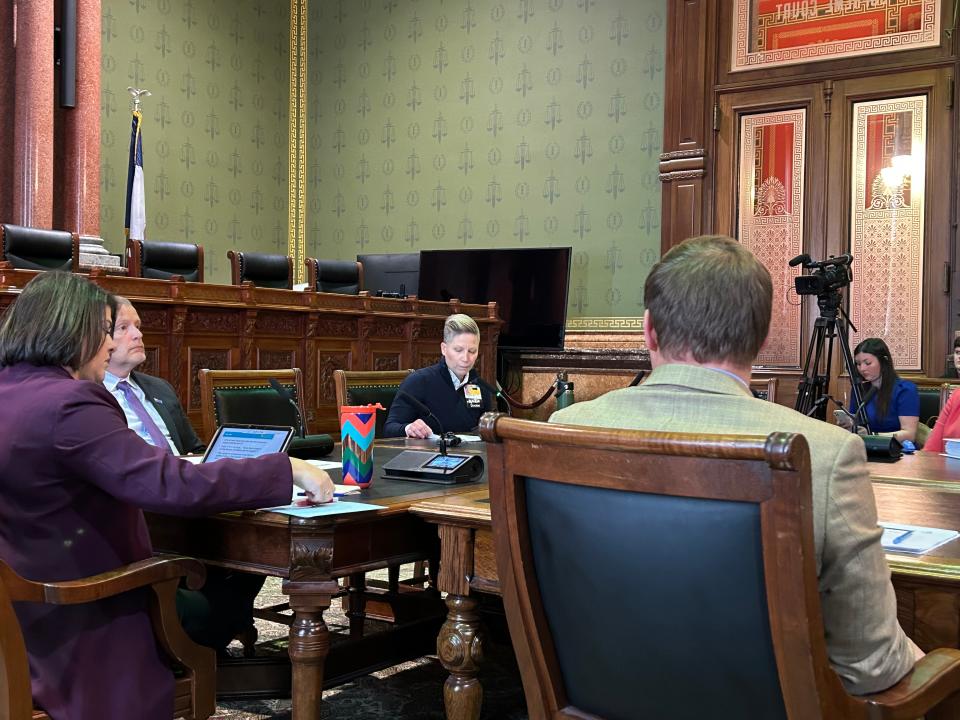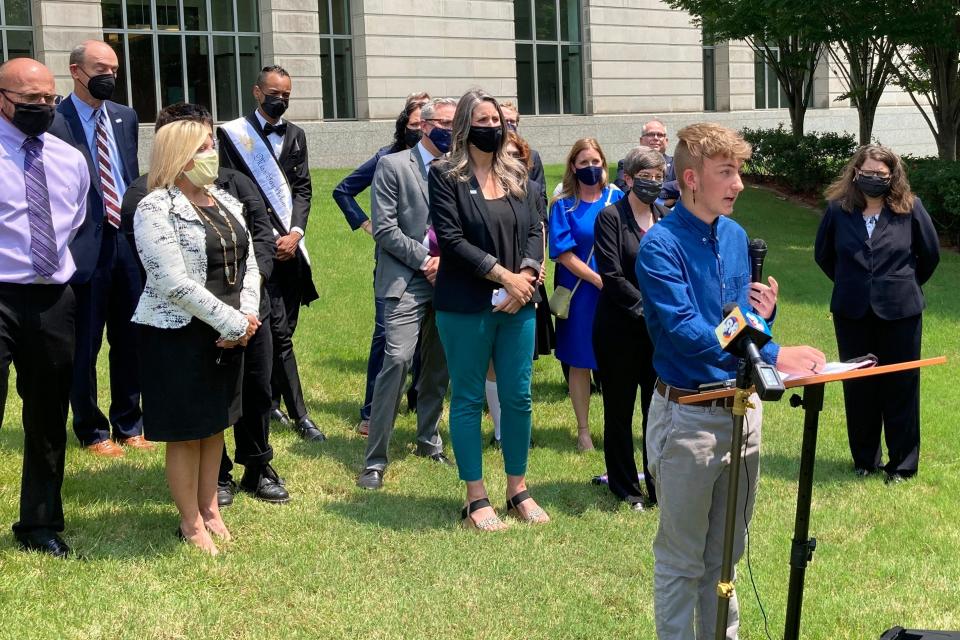Iowa's gender-affirming care ban is chasing transgender kids out of state for medical care
Kathy Hotsenpiller and her daughter, Hannah, packed up the car on Monday evening for another five-hour drive to Minneapolis.
Hannah, who is transgender, missed school Tuesday to see her new doctor at the University of Minnesota. Because of a new Iowa law, which takes effect fully this week, transgender minors are no longer permitted to access gender-affirming care within state lines — sending families like the Hotsenpillers to seek it elsewhere.
"I was panicking when I found out that the law was passed," Kathy Hotsenpiller recalled. "We had finally gotten to the point where (Hannah) felt good about herself. And then now, they were saying we had six months to get our child off the medications or find a provider outside of Iowa."
Amid a national fervor over transgender care for children, Republican leaders in Iowa passed Senate File 538, which prohibits Iowa doctors from prescribing puberty blockers, cross-sex hormones or gender-affirming surgeries to transgender people under 18.
Rep. Steve Holt, R-Denison, said the law protects Iowa kids from permanent changes they may later regret. He and other Republican supporters of the law argue there's not enough data to support gender-affirming care for transgender minors, despite all major American medical organizations recommending the treatments.
"We thought it was extremely important to protect children from that. Again, once someone turns 18 years of age, if they want to look at the data and make that decision, they can do that," Holt said. "But we believe the data clearly showed that it was appropriate for us to protect minor children from these procedures."
Gov. Kim Reynolds signed the law March 22, giving doctors six months to taper patients off any puberty blockers or hormones they provided to transgender youth.
That six-month countdown ends Sept. 18, meaning hundreds of adolescent and teen patients no longer are allowed access to gender-affirming care within Iowa.
Many are still scrambling to find doctors in neighboring states — and competing with transgender teens from other red states that passed similar laws and are also seeking treatment.
"Even though some folks have found continued care, it might not be in the timeframe that they actually need," said Keenan Crow, a lobbyist for One Iowa. "At this point, the waiting lists have gotten so long from so many other states restricting care that, right now, folks are having trouble actually getting the services they need in the time that they need them."

What is gender-affirming care? How many kids received it in Iowa?
Gender-affirming care refers to medical interventions that affirm a transgender person's identity.
Major medical groups, including the American Medical Association, American Psychological Association and the American Academy of Pediatrics, all recommend providing transgender youth with medical care that helps them live as the gender that matches their identity.
For transgender children, that may mean counseling and starting to use a new name or pronouns in school and other settings, said Dr. Angela Goepferd, medical director of the Gender Health Program at Children’s Minnesota health system.
Many young children transition socially with no other medical intervention — just a new haircut or wardrobe.
As transgender kids get older, doctors may offer other options such as medication. About half of pediatric patients ultimately receive cross-sex hormones or medication to pause puberty.
Transition-related surgeries for those younger than 18 are extremely rare, happening among less than 1% of patients, Goepferd said.

From March 2022 through March 2023, the University of Iowa's LGBTQ clinic treated 211 patients under 18, according to data shared with the Des Moines Register. Forty-three patients received puberty blockers, and 90 received cross-sex hormones.
Mastectomies — the removal of breast tissue — were performed on five transgender minors at the University of Iowa during that timeframe. The clinic did not perform any surgeries on minors' reproductive organs.
UnityPoint Health also provided hormone therapies and puberty blockers to patients under 18, but health system officials wouldn't share the number of patients that received gender-affirming care from its providers.
Why did Iowa ban gender-affirming care for minors?
Transgender issues took a spotlight in American politics over the past several years.
Republican-led states, including Iowa, passed laws to bar transgender girls and women from women's sports, as well as laws prohibiting transgender individuals in specified settings from using the restroom that aligns with their gender identity.

Companies have faced conservative ire for partnering with transgender influencers or acknowledging transgender identities. And Republican presidential candidates, campaigning across Iowa, are quick to assert that a person cannot change their gender.
This year, more than a dozen states passed laws prohibiting transition-related care for minors during a record-breaking year for anti-LGBTQ legislation, according to the Williams Institute, a think tank on sexual orientation and gender identity public policy based at the UCLA School of Law.
Many of those states argued that insufficient research exists on the issue, health care providers are pushing such treatments recklessly and minors are not mature enough to comprehend the consequences of medically transitioning.
"Our intent was not to target anyone in any way, but rather to try to protect children," said Holt, the Iowa lawmaker. "And once these folks turn 18 years of age, if they want to look at the data and make a decision to have these therapies or have these surgeries, then that is their choice entirely."

The Williams Institute estimates 106,200 young people are affected by bans in red states, representing about a third of all transgender youth in the United States.
"It is unlikely that all those young people will be able to travel to access care in another jurisdiction," said Elana Redfield, federal policy director at the Williams Institute.
As the Iowa Legislature considered its law earlier this year, doctors, LGBTQ advocacy groups and parents of transgender children said that allowing a minor to access gender-affirming care — without making them wait until adulthood — can be life-saving.
When transgender kids receive gender-affirming care, doctors say they have less depression and less anxiety and are less likely to commit suicide.
"Everything we do in medicine is based in science, and it's based on research and outcomes," Goepferd said. "What we know about gender-affirming care is that when young people have access to it, they do better. That's why we provide it in the first place. If they didn't do better, we wouldn't offer it."
Families seek care out of state but face long waitlists
Hannah Hotsenpiller was thrilled to start taking estrogen right before her sophomore year of high school began.
Hotsenpiller came out to her parents as a transgender girl about six months earlier, in the spring of 2022. On the advice of doctors and mental health professionals, the University of Iowa Hospitals and Clinics prescribed gender-affirming hormones to Hannah in August 2022, when she was 15.
"That was pretty life-changing for her," recalled Kathy Hotsenpiller, Hannah's mom. "She finally felt like herself, and you could see the confidence in how she carried herself and how she spoke to us around the house. It was just really nice to see my kid not be so depressed and anxious about everything."
But the Hotsenpillers faced a new challenge just a few months later, as Iowa Republicans made Hannah's treatments illegal. Kathy and her husband started searching for a doctor who could continue providing Hannah with hormones.
"It was like a full-time job at first, just making all the phone calls and speaking to different people," she said.
Crow, the One Iowa lobbyist, said finding out-of-state doctors became a “community-wide effort,” as parents called clinics and reported back to other families in the state. One Iowa hosted a Zoom call in March about finding care for transgender kids. More than 100 people attended.
As the countdown began, health care systems also scrambled to help patients. Dr. Katie Imborek, co-director of the University of Iowa's LGBTQ+ Clinic, said in an email to the Des Moines Register that the clinic worked to create individualized care plans under the scope of the new law that included, if families were interested, information about out-of-state options.

In March, when the law passed, the clinic was caring for about 250 transgender and gender-diverse patients younger than 18, Imborek said.
The Hotsenpiller family found a doctor at the University of Minnesota and visited for the first time during the summer to "work out all the hiccups" in the process.
But with a record number of states enacting similar bans this year, more patients are flocking to states where medical access is still preserved. As a result, families have faced daunting waitlists in neighboring clinics that can mean waiting up to a year for an appointment.
Kate Middleton waited a few months before seeking an out-of-state doctor for her 12-year-old daughter, Emma, who is transgender. Emma had a puberty blocker implant placed in January that would last for at least a year.
When Middleton started making calls, medical providers across the Midwest turned her away.
"Everywhere was like, we wish we could help you but we don't have enough providers to take out-of-state patients. We were just trying to deal with our own patients right now," she recalled. "We'll put you on a waitlist."
Eventually, Middleton spoke to a doctor at the Hennepin Healthcare Clinic in Minnesota who said Emma's puberty blocker will last two years, buying the family more time before they need to make an in-person visit.
"We have the means, we have the time, we have the motivation to take our kid out of state and make all these phone calls and drive the distance and find the way," Middleton said. "I think a lot of parents are in the same situation."
Out-of-state doctors see wave of transgender patients from red states
Since Iowa, North Dakota and South Dakota enacted gender-affirming care bans in February and March, Children's Minnesota Gender Health Program has seen a 40% increase in demand from out-of-state patients. Goepferd said officials anticipate that demand will continue to rise with Iowa's law now fully in effect.
Children's Minnesota is recruiting more providers to meet growing demand from nearby states, but that effort takes time. Until then, patients are waiting up to 15 to 18 months to see a provider to resume treatment, Goepferd said.
Providers in neighboring states work to reduce the number of trips transgender youths in states with bans have to take for care, but Goepferd said that's not always possible. For example, some health systems offer telehealth visits for transgender care, but patients would still need to cross state lines to comply with these bans.
Although Hannah found care at the University of Minnesota, Kathy Hotsenpiller said Iowa's new law makes everything much more complicated.
Not only does Hannah have to see the doctor out of state, but the Hotsenpillers need to pick up her hormones there too. If Hannah's dosage needs to be adjusted — which would be common in a growing teen — the family has to head back north to pick up more.

Kate Middleton said she's already missing the care that Emma used to receive from the University of Iowa, just blocks away from the family's house.
"Literally down the street is top-of-the-line care with the best endocrinologist," she said. "It's frustrating because I just want to go down there and be like, 'Hey, I want to talk to you about how the blockers are going.'"
Not every family in Iowa will have the financial resources to jump these hurdles, and pushing gender-affirming care to other states will only widen the gap for patients who already struggle to access care, Goepferd said.
"The families who will drive are going to be the families who already have the best access to health care and who already, from a socioeconomic standpoint, experience privilege and advantage," they said. "The families who are not going to be able to do that are already the families who are experiencing health disparities, who don't have access to health care or doctors or insurance or the information and knowledge they need to get good care for their family.
"So we are going to widen health care disparities in this country by enacting this type of legislation because those who have the means to access it will continue to access it. And those who do not will simply go without care."
What repercussions could doctors face under this law?
Iowa health systems have reaffirmed their dedication to providing health care to transgender youth while still complying with the law, emphasizing there are no plans to shut down LGBTQ-focused health care clinics or to stop gender-affirming care that is allowed under the law.
"Other than no longer providing the prohibited therapies, the new law does not otherwise impact the medical care we provide to transgender minor patients and their families, and our healthcare providers will continue to follow nationally recommended, evidence-based standards of care as established by major health organizations," UnityPoint Health said in a statement. "As such, we will continue to provide other health care in a safe, welcoming, and inclusive environment."
University of Iowa Health Care also said in a statement its providers "will continue to provide welcoming and affirming care in accordance with state law."
However, the ban on transition-related services for minors has created uncertainty among some medical professionals about how much they can help patients access this care elsewhere without facing serious repercussions.

Any health care provider who violates the law could lose their license or face disciplinary action from the state regulatory body. The state’s attorney general may also take legal action to enforce the law.
Doctors could also face a civil lawsuit from any Iowan, regardless of whether they had received the care or otherwise were directly affected.
Most Iowa doctors who provide gender-affirming care and were contacted by the Register declined interview requests, citing concerns over potential ramifications from the law.
The new law does not explicitly prevent doctors from referring patients to out-of-state providers who offer transition-related care, but it does include a provision that prohibits health care professionals from knowingly engaging in “conduct that aids or abets” gender-affirming care for minors.
That language could be interpreted to mean Iowa doctors are not allowed to refer patients to providers that offer these services to minors, said Redfield, of the Williams Institute.
Redfield also argued that the threat of losing their license or facing a lawsuit could have a chilling effect on any type of care that medical professionals offer for transgender minors.

"It creates a situation where the physician has to be extraordinarily careful, and it could really strongly disincentivize any sort of treatment for transgender patients," she said.
That has not been Goepferd's experience, they said, as many doctors from Iowa and other nearby states with bans have been contacting providers in Minnesota to help facilitate care for their patients.
However, Goepferd said the gender-affirming care ban could drive health care professionals out of Iowa, instead opting to practice in a state without these restrictions.
"All of us who care for kids, whether they're transgender kids or other kids, we all went into this profession to help kids thrive and to provide them with optimal health care," they said.
Could lawsuits in other states impact Iowa’s ban?
Legal experts are watching how court decisions playing out across the country could affect gender-affirming care bans in other states, including a recent ruling from a federal judge in Arkansas.
In June, an Arkansas federal court judge struck down a state law that would have banned all gender-affirming care to transgender individuals under age 18 and blocked doctors from referring those patients to another medical provider. In his ruling, the judge said the ban was unconstitutional and would cause irreparable harm to transgender youth.

Arkansas can still appeal the decision. However, the U.S. Court of Appeals for the 8th Circuit — which includes Iowa — previously upheld a preliminary injunction on the law last year. It again declined to reconsider that decision earlier this year.
Legal experts have said this ruling, along with other pending lawsuits across the country, could set a precedent for future legal challenges in other states.
Katie Akin is a politics reporter for the Register. Reach her at kakin@registermedia.com. Follow her on Twitter at @katie_akin.
Michaela Ramm covers health care for the Des Moines Register. She can be reached at mramm@registermedia.com, at (319) 339-7354 or on Twitter at @Michaela_Ramm
This article originally appeared on Des Moines Register: Iowa ban on gender-affirming care for kids takes effect. What to know:

